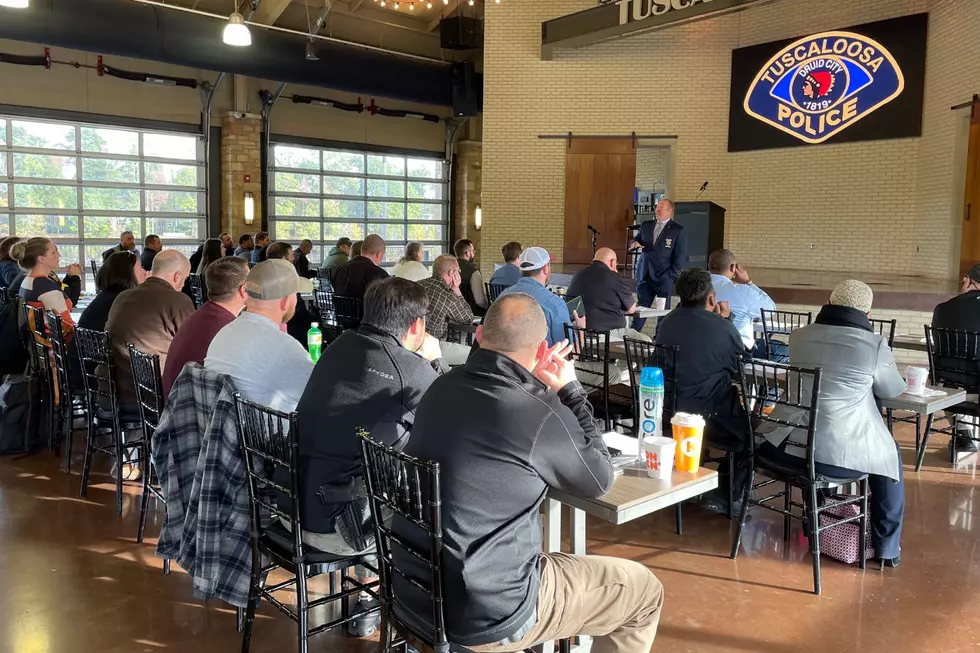
Tuscaloosa Police Train Other Agencies on Firearms Forensics Tech Wednesday
The Tuscaloosa Police Department hosted a training Wednesday to inform state law enforcement agencies on a system that aids in sharing data on gun crimes with other agencies to reduce crime.
TPD, along with the Bureau of Alcohol, Tobacco, Firearms and Explosives Nashville Division and the U.S. Attorney's Office, hosted a one-day training to learn the National Integrated Ballistics Information Network site for peer-to-peer discussions on the best practices and resources for using the tool.
According to atf.gov, NIBIN was established in 1997 "to provide local, state, tribal and federal law enforcement partners with an automated ballistic imaging network."

The network allows agencies to upload bullets and shell casings that are collected as evidence for analysis, which is a faster process for getting gun crime offenders off of the streets.
Mitch Rector was recruited from the Birmingham Police Department to TPD to oversee the use of NIBIN in early 2020, making Tuscaloosa the first agency in the state to use the NIBIN technology in their forensics department.
"Tuscaloosa, being situated over here in West Alabama, is a large geographical area where you can pull information from because not only are the people who live in Tuscaloosa using firearms in the wrong way, you have people coming from other communities to Tuscaloosa," Rector said. "Tuscaloosa is the first stop for many people in West Alabama and Eastern Mississippi. Tuscaloosa felt the need for that so the City of Tuscaloosa went all in and purchased a machine."
Rector said he hopes the training will allow agencies that have since added NIBIN usage in their department to have similar practices that will allow agencies to share ballistics information that could connect one crime to another one that may have occurred in a separate jurisdiction.
"The machines are constantly communicating back and forth with each other," Rector said. "For example, if we have a shooting that happens here in Tuscaloosa, and three days later, someone in Huntsville is stopped and a firearm is recovered, if they test the firearm, they can determine the firearm may be connected back to the incident here. We wouldn't know that otherwise without the technology."
ATF Assistant Special Agent Ashley Lightner said the NIBIN technology is aiding in investigation efforts and are advancing new-age crime reduction efforts.
"Things are always improving and advancing," Lightner said. "I've been in law enforcement for 30 years and if the guys from 30 years ago could see what we're doing now, they would like it and think it's good, but it would be a big change from what they've seen in the past. We're always trying to leverage technology and always trying to improve ourselves. That's the point of this training. I think this does improve us when we can look at ballistics and try to match crime scene to crime scene where we may not have known before in our investigations."
U.S. Attorney Prim Escalona for the Northern District of Alabama said this training is helpful in aiding local agencies in prosecuting gun violence offenders and reducing their chances of repeating crime in the future.
"Our office's philosophy is that we work with our state and local law enforcement partners to identify the drivers of violent crime, the most dangerous criminals in the community that are driving up violent gun crimes," Escalona said. "Once we have identified those persons, we use our federal tools, which are statutes about firearm possession, to federal prosecute individuals. We use those tools and NIBIN is intricate in that because of its ability to link guns to crimes and then use that as investigative leads to identify individuals who are committing those crimes and get them out of communities."
Steve Rice, TPD's assistant police chief, commended Rector for his leadership in conducting the training and bringing awareness of the technology to other jurisdictions.
"Chief Blankley recognized the importance of NIBIN and he really steered our entire principles, policies and guidelines," Rice said. "We went out and stole one of the best NIBIN people in the state and brought him into our agency and Mitch has really picked up the torch and ran with it. The genesis of the training today was Mitch, who recognized the importance of getting NIBIN users in the same room to talk about issues."
Top Stories from the Tuscaloosa Thread (11/7 - 11/14)
More From Tuscaloosa Thread









